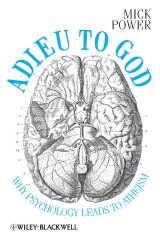Details

Adieu to God
Why Psychology Leads to Atheism2. Aufl.
|
25,99 € |
|
| Verlag: | Wiley-Blackwell |
| Format: | EPUB |
| Veröffentl.: | 06.01.2012 |
| ISBN/EAN: | 9781119979951 |
| Sprache: | englisch |
| Anzahl Seiten: | 216 |
DRM-geschütztes eBook, Sie benötigen z.B. Adobe Digital Editions und eine Adobe ID zum Lesen.
Beschreibungen
<i>Adieu to God</i> examines atheism from a psychological perspective and reveals how religious phenomena and beliefs are psychological rather than supernatural in origin. <ul> <li>Answers the psychological question of why, in the face of overwhelming scientific evidence to the contrary, do religions continue to prosper?</li> <li>Looks at atheism and religion using a fair and balanced approach based on the latest work in psychology, sociology, anthropology, psychiatry and medicine</li> <li>Acknowledges the many psychological benefits of religion while still questioning the validity of its supernatural belief systems and providing atheist alternatives to a fulfilling life</li> </ul>
Preface ix <p>1. A Short History of Religion 1</p> <p>2. The Psychology of Religion—The Varieties of Normal Experience 33</p> <p>3. The Psychology of Religion—The Varieties of Abnormal Experience 61</p> <p>4. Social Structures and Religion 89</p> <p>5. Religion, Power, and Control 113</p> <p>6. Religion and Health 141</p> <p>7. How to Be a Healthy Atheist 167</p> <p>References 181</p> <p>Author Index 191</p> <p>Subject Index 195</p>
“In this fascinating little book (201 pages, including references and a subject index), Mick Power communicates no such tinge of agnosticism when proclaiming in the preface of Adieu to God: Why Psychology Leads to Atheismthat “my belief is that psychology (with help from philosophy, anthropology, sociology, physics, biology . . .) offers a far more powerful explanation than any religious system ever will” (p.x).” (<i>PsycCRITIQUES</i>, 1 June 2013) <p>“His final chapter summarises the argument and proposes how one might be a healthy atheist with a sense of meaning and purpose, a sense of belonging and community and a set of personal goals and values. He does not forecast the disappearance of religions but proposes how they can be explained in terms of psychology and sociology.” (<i>The Scientific & Medical Network</i>, 1 April 2012)</p>
<b>Mick Power</b> is Professor of Clinical Psychology at the University of Edinburgh, as well as a practicing Clinical Psychologist who has worked at Guy's Hospital and Maudsley and Bethlem Hospitals. Raised as a Catholic, Power became an atheist at 16.
Rumors of the shortcomings and death of organized religion abound in modern society. However, even in the face of overwhelming scientific evidence to the contrary, organized religion continues to prosper. In <i>Adieu to God</i>, psychologist and atheist Mick Power examines this dichotomy from a psychological perspective. He argues that although religion provides certain social and psychological benefits, atheism provides a more fulfilling path to these objectives. <p>In recent years, scientists have officially disproven the existence of gods and the supernatural. Yet, these beliefs persist because of the comfort and sense of understanding these ideas offer their followers. Power argues that these religious beliefs must be viewed through both a psychological and social lens. He uses examples from a variety of religions, including Christianity, Islam, Judaism, Buddhism, Scientology and Mormonism, to demonstrate how psychological principles explain key religious beliefs and phenomena. At the same time, he incorporates the latest research in psychology, sociology, anthropology, psychiatry and medicine to show the ways in which atheism supercedes the benefits of organized religion and can lead to a more fulfilling life.</p> <p>Thorough and balanced, Mick Power gives a complete look at the psychological implications of organized religion while also providing a convincing argument for atheism in today's world.</p>
Dawkins and Dennett taught us that there’s no room for God in biology. Stenger and Hawking taught us that there’s no room for God in cosmology either. Now Mick Power pushes God out of his last safe haven: the human mind. Power has written a great little book, showing that psychology is just as much of a threat to religious belief as evolutionary theory and cosmology. Fundamentalists are going to lose a lot of sleep over this one!<br /> —<b><i>Dr. Steve Stewart-Williams</i></b><i>, Lecturer in Psychology, Swansea University, UK</i> <p>“In <i>Adieu to God,</i> Mick Power gives a powerful and humane account of the case for atheism from an under-explored angle.”<br /> —<b><i>Andrew Copson</i></b><i>, Chief Executive, British Humanist Association, UK</i></p>
Diese Produkte könnten Sie auch interessieren:

The Wiley-Blackwell Handbook of Childhood Social Development

von: Peter K. Smith, Craig H. Hart

136,99 €
















